The SaaS product environment is massive. According to stats from Exploding Topics, the SaaS industry has grown by an astounding 500% over the past seven years; in the United States alone, there are around 17,000 software service companies. If you think of a problem, there is likely a company out there that is trying to solve it.
No matter what audience they're serving and what their product is offering, every company is working towards one primary objective: to get people to use their software. For that, they create numerous strategies, from product design to marketing and sales positioning, as well as in customer service and integrations.
What they're all trying to ultimately achieve is product adoption, the process that defines when customers become active and successful users of your product over the long term and evolve from being users to advocates.
What is product adoption?
Every aspect of the product involved in the user experience is designed to make the product stick. The goal is for users to find value quickly, become active users of the product, and continue usage over time. This is what product adoption is all about.
Product adoption is the moment when users have identified the value of your product and start successfully accomplishing goals using it.
In your typical SaaS conversion funnel, the adoption happens somewhere around the activation and retention moments, when the user is actively using the product and has identified the value that will keep them coming back.
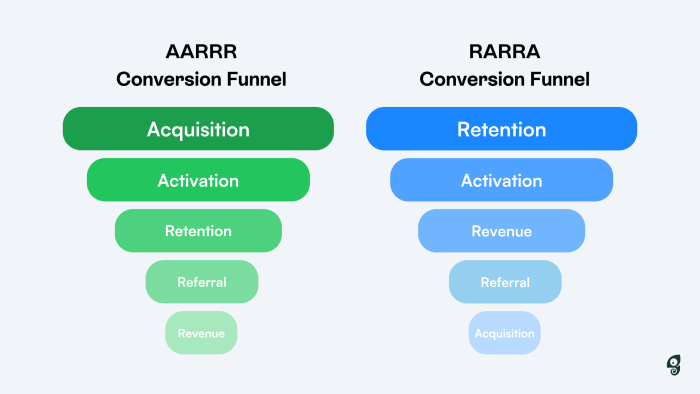
How users become product adopters
While any SaaS company wishes that its entire user base becomes an adopter, it's unlikely that every person who tries out the product will become successful over the long haul. What will turn a user into an adopter is very particular to each company, and their needs will be mostly based on their user persona.
To start the process of measuring how you can increase product adoption within your user base, you should identify 5 common types of product adopters: innovators, early adopters, early majority, late majority, and laggards.
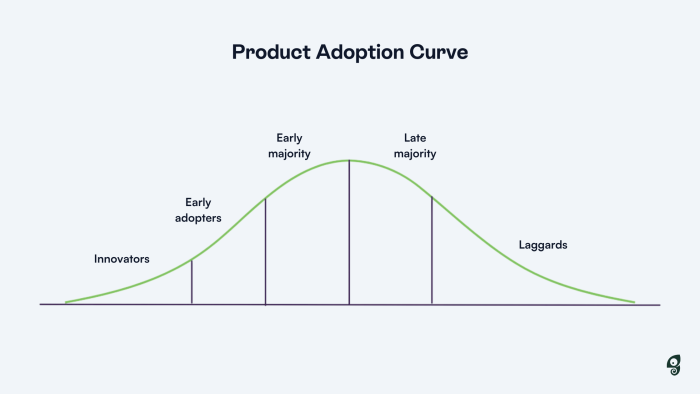
Innovators
They like being the first to try something new and are eager to find value.
Early adopters
They also show interest early, are attuned to what innovators are doing, and will be eager to adopt.
Early majority
They like to follow the masses and will become influenced to adopt once there's a relevant base doing it.
Late majority
They show some resistance to adoption and have a harder time accepting what's new but might show interest when the large majority is onboard.
Laggards
They are the most resistant to change and are the last to welcome any new innovation into their lives.
Once you have segmented your users into different groups, you can start to customize how to interact with and onboard each type of user. That extra bit of personalization really goes a long way.
Measuring product adoption
Unlike other more familiar product terms like user activation and retention, adoption isn't a specific product metric, so assessing it can be somewhat of a challenge.
Pinpointing the moment that the adoption occurs and when the user becomes an adopter can be tricky. The event can be affected by so many aspects of the user’s experience.
Every SaaS team can benefit from developing a framework for creating and assessing the success of their product adoption strategies.
Therefore, the metrics used to measure product adoption will be contextual to the product and can include common metrics like Time to Value (TTV), churn, conversion rates, etc., but a lot of opportunities lie in understanding how users are interacting with your product at different stages of their journey.
However, before you can even decide what metrics you will be looking at, you need to first find what it is that is hurting your product adoption, or as we like to call it, find the product adoption bug.
Are users struggling to get started, and if so, what can be blocking them? Are they experiencing friction with some particular feature, and if so, what is causing it? Once you've established what is hurting your product, you can then figure out what metric needs to change to indicate that your bug has been exterminated.
For example, if your product adoption is hurting because you're experiencing high churn, then churn is what you will want to measure. Or if what's causing trouble in the adoption department is users not activating a particular feature, then feature usage rates are what you might want to look at.
Some questions to help you start defining your product adoption metrics:
Are users completing the user onboarding flow?
Does the frequency of doing so correlate with use and feature adoption?
What events cause potential friction, bugs, drop-off, or churn?
Are they activating key features?
Do they have opportunities to provide feedback?
How easily can they self-serve help?
More on Product Adoption
Ready to get started on improving product adoption for your company? Chameleon is a product adoption platform that helps SaaS teams transform users into advocates by easily creating and implementing in-app messages. Interacting with users where they're most engaged - inside your app - is a powerful way to gauge how you can make them stay and love your product.
As the deepest product adoption tool out there, we give our community plenty of resources to understand how product adoption can benefit growth and empower product strategies.
Explore some more of our content on product adoption and subscribe below to receive content updates (including our live events!) every week.
📖 Product Adoption 101

Product Adoption Curve: The Five Customer Segments to Look Out For
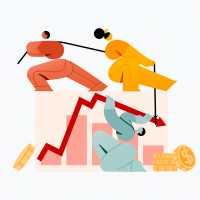
How Product Adoption Creates Recession-Proof SaaS Businesses
📖 Product Adoption Tools
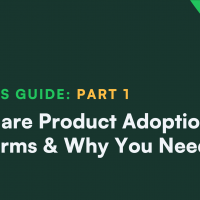
Product Adoption Platforms: What Are They and Why You Should Care
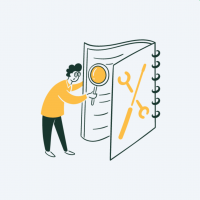
33 Best User Onboarding Software Tools to Drive Delight in 2024
📖 Product-led Growth

Product-led growth: definition, examples & framework for high acquisition & retention






